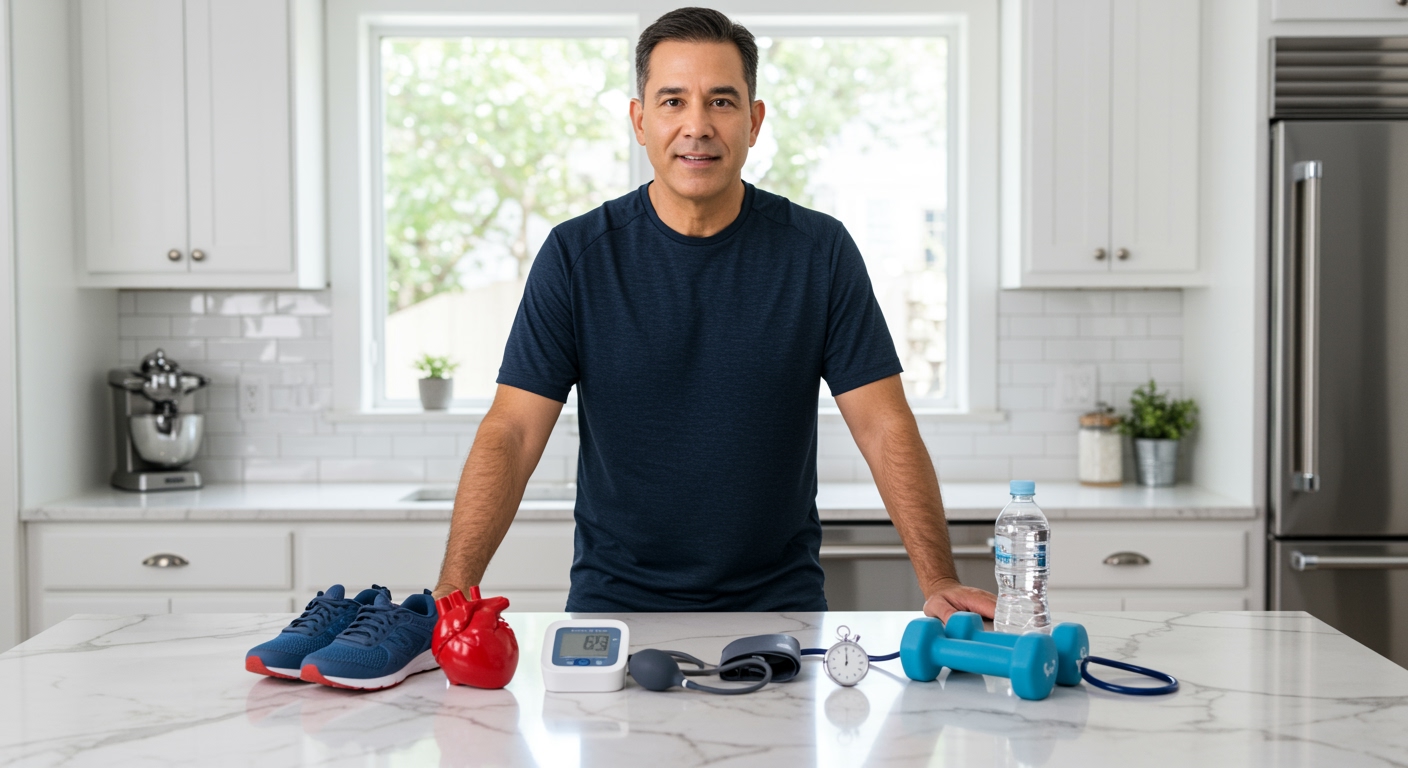✪ Key Takeaway: People with high blood pressure should exercise more, but start slowly with moderate activities like walking.
Introduction
Your doctor just told you that your blood pressure numbers are too high.
Now you wonder if hitting the gym will make things worse or better for your heart.
Hi, I’m Abdur, your nutrition coach and today I’m going to explain exactly how exercise affects your blood pressure and what you should do about it.
Does Exercise Actually Lower Blood Pressure?
Exercise works like a natural medicine for your blood vessels.
When you move your body regularly, your heart becomes stronger and pumps blood more efficiently.
This means your heart does not have to work as hard to push blood through your arteries.
Research shows that regular physical activity can reduce systolic blood pressure by 4 to 9 mmHg.
That might not sound like much, but this reduction can be the difference between needing medication or managing your condition naturally.
Exercise also helps your blood vessels stay flexible and healthy.
When your arteries can expand and contract properly, blood flows more smoothly and puts less pressure on artery walls.
✪ Fact: Just 30 minutes of moderate exercise most days can lower blood pressure within 2-3 months.
What Types Of Exercise Work Best?
Aerobic exercise gives you the biggest blood pressure benefits.
Activities like brisk walking, swimming, cycling, and dancing get your heart pumping without putting too much strain on your cardiovascular system.
These exercises improve how your heart uses oxygen and make your entire circulatory system work more efficiently.
Resistance training with light weights can also help, but you need to be more careful.
Heavy weightlifting can cause temporary spikes in blood pressure that might be dangerous if your numbers are already high.
Stick to lighter weights with more repetitions instead of trying to lift the heaviest weight possible.
Flexibility exercises like gentle yoga and stretching help reduce stress hormones that can raise blood pressure.
✪ Pro Tip: Start with 10-minute walks and gradually increase duration as your fitness improves.
Are There Exercises You Should Avoid?
Some activities can push your blood pressure to dangerous levels.
Heavy weightlifting, especially exercises where you hold your breath and strain, can cause your blood pressure to spike suddenly.
This happens because holding your breath while lifting creates extra pressure in your chest cavity.
High-intensity interval training might also be too much if your blood pressure is not well controlled.
Activities that involve sudden changes in body position, like certain yoga poses where your head goes below your heart, can also cause problems.
Competitive sports with lots of stress and adrenaline can temporarily raise your blood pressure to unsafe levels.
The key is avoiding anything that makes you feel dizzy, causes chest pain, or leaves you extremely short of breath.
✪ Note: Always breathe normally during resistance exercises and never hold your breath while lifting.
How Should You Start Exercising Safely?
Talk to your doctor before starting any new exercise program.
Your doctor might want to do some tests to make sure your heart can handle increased activity safely.
Start with just 5 to 10 minutes of gentle activity like slow walking.
Pay attention to how your body feels during and after exercise.
You should feel energized, not exhausted or dizzy.
Monitor your blood pressure before and after workouts, especially when you first start.
This helps you understand how different activities affect your numbers and gives you confidence that exercise is helping rather than hurting your health.
✪ Pro Tip: Keep a simple log of your activities and how you feel to track your progress safely.
What About Exercise And Blood Pressure Medications?
Exercise and blood pressure medications work together beautifully.
Your medication helps control your numbers while you build the fitness habits that provide long-term benefits.
Some blood pressure medications can affect how your body responds to exercise.
Beta-blockers, for example, can make your heart rate stay lower during workouts.
This does not mean the exercise is not working, just that your heart rate response might be different.
Never stop taking your medication just because you start exercising.
As your fitness improves and your blood pressure gets better, your doctor might be able to adjust your medication, but this decision should always be made together.
✪ Note: Regular exercise might help you need less medication over time, but changes should be doctor-supervised.
The Bottom Line
People with high blood pressure should definitely exercise more, but they need to start slowly and choose the right activities.
Movement is medicine, but like any medicine, the dose and type matter more than good intentions.
I would love to hear about your experience with exercise and blood pressure management, so please share your questions or thoughts in the comments below.
References
At NutritionCrown, we use quality and credible sources to ensure our content is accurate and trustworthy. Below are the sources referenced in creating this article:
- PMC: Exercise and Hypertension
- Intermountain Healthcare: What Exercises Should Be Avoided With High Blood Pressure
- PMC: Physical Activity and Blood Pressure
- German Journal Sports Medicine: Physical Activity and Arterial Hypertension





